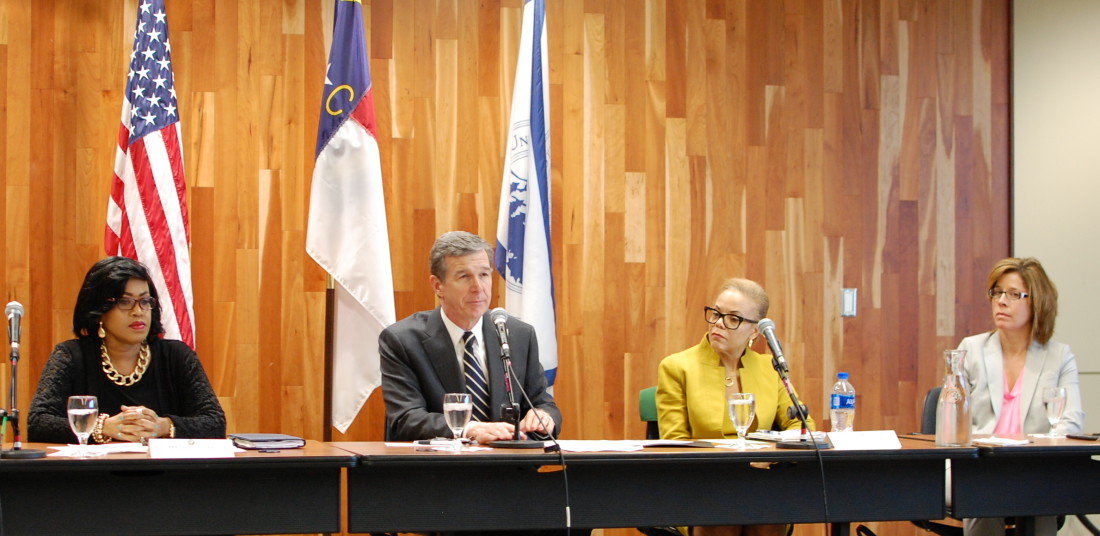Confronted with the idea that he doesn’t get to Asheville and the Western region of the state enough, North Carolina Gov. Roy Cooper agreed, but promised, “We are going to do more.”
At an April 23 meeting of his cabinet at UNC Asheville, Cooper opened by remarking, “I am delighted to bring the cabinet and government to you,” to a room filled with elected officials, community leaders and local residents.
Cooper, who is from Nash County in the Northeastern quadrant of the state, tipped his cap to his rural roots: “I understand the particular challenges and opportunities that are a part of rural North Carolina,” he said. He previewed a planned visit to Marshall the following day to promote his freshly launched Hometown Strong initiative, along with partnerships already established in several of the state’s 80 counties designated as rural. Cooper described the new program as an “action team” that will work with counties on economic development, broadband internet access and improving quality of life. Designed to break down silos and connect people from various parts of government and the private sector, the action team will help “bring more attention and help to our rural counties,” Cooper said. Madison County is joining six other counties as pilot locations for the program.
Secretaries reported on projects and priorities of their departments, highlighting the issues most likely to impact WNC. The projects relate to what Cooper calls his “CEO statement for North Carolina,” which envisions “a state where people are better educated, where they are healthier, where they have more money in their pockets and they have the opportunities to live a more abundant and purposeful life.” Central themes included job creation, environmental protection, education, infrastructure building and expansion (especially highways, including Interstate 26, and broadband internet access), health outcome improvement for the most vulnerable, opportunities for women, school safety and cyber security.
State budget director Charles Perusse filled out the funding picture for these policy priorities at the end of the meeting, providing some clues to what the governor’s proposed fiscal year 2018-19 budget will include.
Cabinet secretaries fan out
Secretaries also discussed what they had seen in visits to six WNC counties the previous day and on the morning of the Asheville meeting.
Michael Regan, secretary of the state’s Department of Environmental Quality, touted the launch of the Western Water Initiative, which he had kicked off that morning at a meeting of the Community Foundation of Western North Carolina. The project will bring together governmental departments and nonprofits “to focus on water quality and quantity issues in this region,” Regan said. He also said he would be meeting with staff based in the Western part of the state to celebrate Asheville-area air quality improvements and their associated benefits for visibility and respiratory health.
Secretary of the N.C. Department of Administration Machelle Sanders spoke with enthusiasm about her visit to Safelight in Henderson County, where she said she experienced the nonprofit’s efforts to “make hope real.” The job training program and Dandelion eatery associated with the domestic violence shelter, Sanders said, left her “warm in stomach and heart and mind.” She thanked the governor for proclaiming April Sexual Assault Awareness month. In Buncombe County alone last year, rape crisis centers served about 700 individuals, while shelters served 1,700, Sanders said; she seeks to increase access to such facilities.
Pam Cashwell, chief deputy secretary of Professional Standards, Policy and Planning, reported on a Buncombe County Re-Entry Council event, where she read the governor’s proclamation of Re-Entry Week, which spotlights people returning to society from incarceration and the many support efforts devoted to them. At the event, Cashwell said, a woman told her powerful story of overcoming addiction. “One of the last things she did was name entities and individuals who had been critical to her success this time,” the deputy secretary recalled, including at least six local organizations and 20 different individuals.
Larry Hall, the head of the state Department of Military and Veterans Affairs, delivered cards from children to elderly veterans at the N.C. State Veterans Home in Black Mountain. State Human Resources Director Barbara Gibson toured Blue Ridge Community College, Revenue Secretary Ron Penny checked on tax processing at Asheville’s service center and Deputy Commerce Secretary Will Miller visited Headwaters Outfitters. A scheduled appearance for Transportation Secretary Jim Trogdon, to present the Extra Mile Award to three N.C. Department of Transportation employees who are considered to have saved a motorist’s life following an accident, was rescheduled due to weather.
All about the money
Perusse wrapped up the meeting with some hints as to what the governor’s proposed budget might include, beyond what as already been shared publicly.
Education topped the list, with a “bold vision to make North Carolina a top-10 educated state by 2025,” including pre-K for low-income children, support for increasing college graduation rates, boosting teacher compensation, school safety and technology. He also underscored previous mentions of rural infrastructure, especially broadband in the far-Western counties; investment in “clean water, air and housing”; increasing opioid treatment services; and prison safety improvements.
On Monday morning before the Asheville meeting, Cooper had visited T.C. Roberson High School, where he unveiled a $130 million proposal for school safety initiatives, urging funding for more school counselors, mental health support systems, school resource officers, facility security upgrades and individualized school safety plans.
Later in the day on Monday, Cooper and Health and Human Services Secretary Mandy Cohen attended an opioid roundtable discussion at Haywood Pathways Center.
The governor’s next visit to WNC will likely be the spring Western Residence open house. According to Cooper’s communications staff, plans for that event have not yet been finalized.




This man, Cooper, is a total FAILURE. He has yet to distribute any of the $236 million from the Feds for Hurricane Matthew recovery … it’s been 18 months, with some ENC towns completely wiped out.
He does not care about his own ENC people. Roy Cooper is a democrackkk disgrace to the citizens of NC. Nasty.